-
 bitcoin
bitcoin $87959.907984 USD
1.34% -
 ethereum
ethereum $2920.497338 USD
3.04% -
 tether
tether $0.999775 USD
0.00% -
 xrp
xrp $2.237324 USD
8.12% -
 bnb
bnb $860.243768 USD
0.90% -
 solana
solana $138.089498 USD
5.43% -
 usd-coin
usd-coin $0.999807 USD
0.01% -
 tron
tron $0.272801 USD
-1.53% -
 dogecoin
dogecoin $0.150904 USD
2.96% -
 cardano
cardano $0.421635 USD
1.97% -
 hyperliquid
hyperliquid $32.152445 USD
2.23% -
 bitcoin-cash
bitcoin-cash $533.301069 USD
-1.94% -
 chainlink
chainlink $12.953417 USD
2.68% -
 unus-sed-leo
unus-sed-leo $9.535951 USD
0.73% -
 zcash
zcash $521.483386 USD
-2.87%
How secure is USDT?
USDT's security is debated, hinging on Tether's unverified claims of dollar backing and opaque auditing. Risks include counterparty risk, regulatory uncertainty, de-pegging, and exchange vulnerabilities; diversification is crucial.
Mar 18, 2025 at 02:00 pm
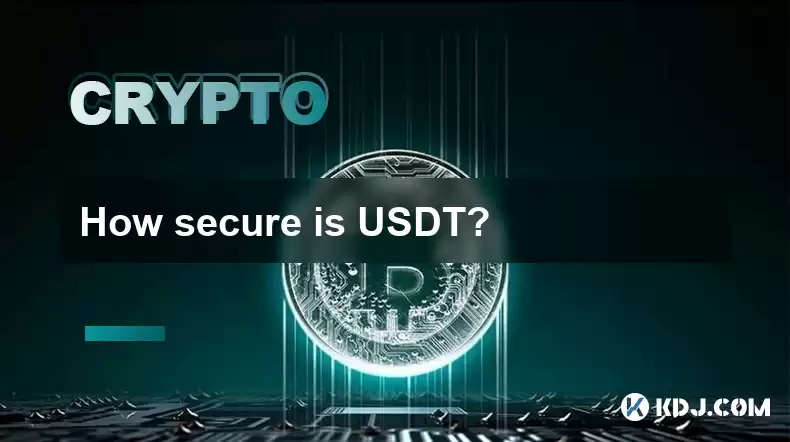
- USDT's security relies on Tether's claims of backing and the underlying mechanisms of its issuance and redemption.
- Auditing issues and lack of transparency have historically raised significant concerns about USDT's security.
- Holding USDT involves risks associated with counterparty risk, regulatory uncertainty, and potential de-pegging from the US dollar.
- Diversification of holdings and understanding these risks are crucial for managing potential losses.
- The security of exchanges holding USDT also plays a crucial role in overall security.
Tether (USDT), the largest stablecoin by market capitalization, aims to maintain a 1:1 peg with the US dollar. However, the question of its security remains a persistent point of debate within the cryptocurrency community. The security of USDT isn't solely about its technological infrastructure, but rather a complex interplay of financial practices, regulatory oversight (or lack thereof), and the trustworthiness of its issuer, Tether Limited.
The core of USDT's claimed security lies in Tether's assertion that each USDT in circulation is backed by an equivalent amount of US dollar reserves. This means, theoretically, for every USDT issued, there's a corresponding dollar held in reserve, ready for redemption. However, the lack of consistent and independent audits has consistently fueled skepticism regarding the veracity of this claim. Past controversies have highlighted discrepancies between reported reserves and the actual amount of USD held, undermining user confidence.
The process of USDT issuance and redemption plays a significant role in its perceived security. Users can typically buy USDT by exchanging other cryptocurrencies or fiat currencies on exchanges. Conversely, they can redeem USDT for US dollars, theoretically ensuring a stable value. However, the efficiency and transparency of this redemption process have been questioned, with reports of delays and difficulties in accessing reserves. This directly impacts the security and trust users place in the system.
Furthermore, the security of USDT is intertwined with the security of the exchanges where it's traded. If an exchange holding a significant amount of USDT is compromised or goes bankrupt, users holding USDT on that platform could potentially lose their funds. Therefore, choosing reputable and secure exchanges is paramount for mitigating this risk. This underscores the fact that the security of USDT isn't solely dependent on Tether's actions but also on the broader cryptocurrency ecosystem.
The legal and regulatory landscape surrounding USDT further complicates its security profile. The lack of clear and consistent regulatory frameworks in many jurisdictions leaves USDT vulnerable to potential legal challenges and enforcement actions. Changes in regulatory environments could significantly impact the availability and usability of USDT, thereby affecting its value and security. This inherent uncertainty adds another layer of risk for users.
Counterparty risk is another significant aspect to consider. This risk stems from the reliance on Tether Limited as the issuer and custodian of the reserves. Any financial distress or insolvency at Tether Limited could directly impact the value and availability of USDT, jeopardizing users' investments. This risk is inherent to any centralized stablecoin system.
The potential for USDT to de-peg from the US dollar is a constant concern. If market events or a loss of confidence in Tether’s backing lead to a significant sell-off, the price of USDT could drop below its intended $1 peg. This de-pegging could result in substantial losses for users holding USDT. Understanding the factors that could trigger a de-pegging event is crucial for managing risk.
Maintaining a diversified portfolio is a vital aspect of mitigating the risks associated with holding USDT. Over-reliance on a single asset, particularly a stablecoin with inherent uncertainties, can lead to significant losses. Diversifying into other assets can help reduce the overall impact of any negative events affecting USDT.
Frequently Asked Questions:Q: Is USDT truly backed 1:1 by the US dollar?A: Tether claims a 1:1 backing, but the lack of consistent, independent audits raises questions about the accuracy and transparency of their reserves.
Q: What are the risks associated with holding USDT?A: Risks include counterparty risk (Tether's financial stability), regulatory uncertainty, potential de-pegging from the US dollar, and exchange-related risks.
Q: How can I mitigate the risks of holding USDT?A: Diversify your cryptocurrency holdings, use reputable exchanges, and stay informed about regulatory developments and Tether's financial disclosures.
Q: Are there alternatives to USDT?A: Yes, other stablecoins exist, each with its own set of risks and backing mechanisms. Research thoroughly before choosing an alternative.
Q: What happens if Tether goes bankrupt?A: The value of USDT could plummet, potentially resulting in significant losses for holders. The exact outcome would depend on the circumstances of the bankruptcy and the legal framework in place.
Q: How often are USDT reserves audited?A: The frequency and independence of audits have been inconsistent and a subject of ongoing debate and criticism. The lack of consistent, transparent audits is a major concern for many.
Q: Is USDT regulated?A: The regulatory landscape surrounding USDT varies significantly across jurisdictions. In many places, it operates in a relatively unregulated space, adding to the inherent risks.
Q: Can I redeem my USDT for USD?A: Theoretically, yes, but the ease and speed of redemption have been questioned, and delays have been reported in the past. This aspect of the process remains a point of concern.
Disclaimer:info@kdj.com
The information provided is not trading advice. kdj.com does not assume any responsibility for any investments made based on the information provided in this article. Cryptocurrencies are highly volatile and it is highly recommended that you invest with caution after thorough research!
If you believe that the content used on this website infringes your copyright, please contact us immediately (info@kdj.com) and we will delete it promptly.
- Work Dogs Unleashes TGE Launch, Sets Sights on Mid-2026 Listing & Ambitious $25 Token Target
- 2026-01-31 15:50:02
- WD Coin's TGE Launch Ignites Excitement: A Billion Tokens Set to Hit the Market
- 2026-01-31 16:10:02
- Royal Mint Launches Interactive £5 Coin for a Thrilling Code-Breaker Challenge
- 2026-01-31 16:10:02
- Crypto, AI, and Gains: Navigating the Next Wave of Digital Assets
- 2026-01-31 15:50:02
- Coin Nerds Forges Trust in the Digital Asset Trading Platform Landscape Amidst Evolving Market
- 2026-01-31 16:05:01
- Blockchains, Crypto Tokens, Launching: Enterprise Solutions & Real Utility Steal the Spotlight
- 2026-01-31 12:30:02
Related knowledge
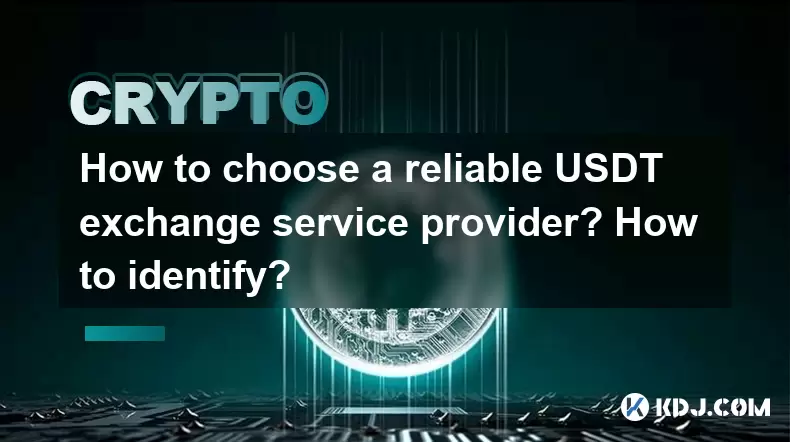
How to choose a reliable USDT exchange service provider? How to identify?
Jun 12,2025 at 03:15pm
Understanding the Role of USDT in Cryptocurrency TradingUSDT (Tether) is one of the most widely used stablecoins in the cryptocurrency market. It is d...
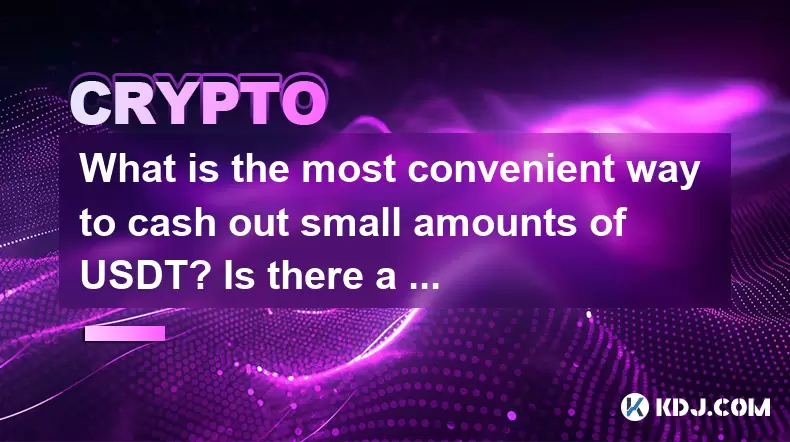
What is the most convenient way to cash out small amounts of USDT? Is there a shortcut?
Jun 11,2025 at 11:00pm
Understanding the Need to Cash Out Small USDT AmountsCashing out small amounts of USDT can be a challenge for many crypto users. Traditional methods o...
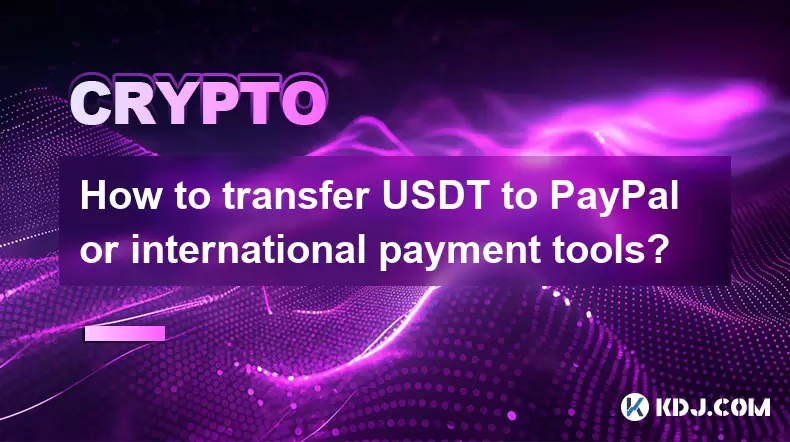
How to transfer USDT to PayPal or international payment tools?
Jun 15,2025 at 05:28am
Understanding the Basics of USDT and PayPal IntegrationUSDT (Tether) is a stablecoin pegged to the US dollar, offering blockchain-based value transfer...
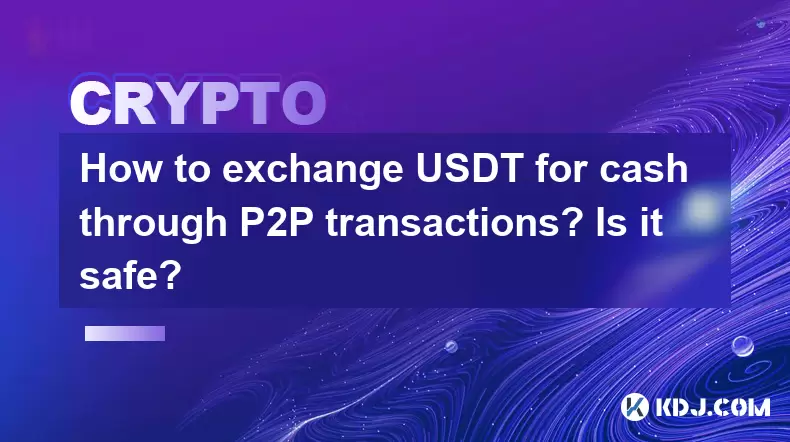
How to exchange USDT for cash through P2P transactions? Is it safe?
Jun 18,2025 at 07:56am
Understanding USDT and P2P TransactionsTether (USDT) is a stablecoin pegged to the value of the US dollar, making it a popular choice for users who wa...
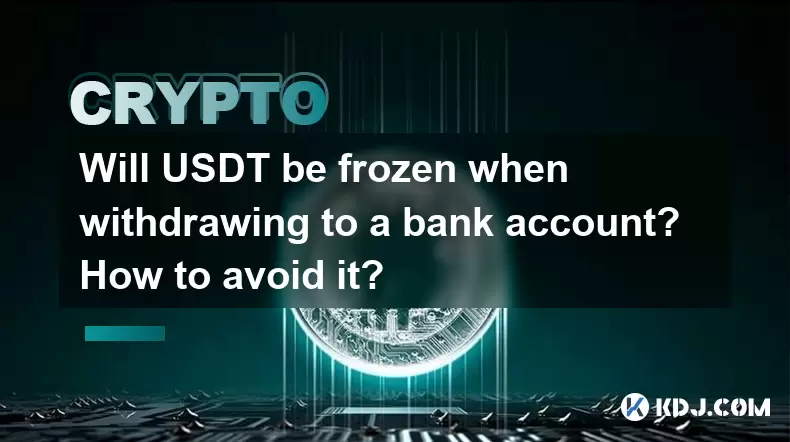
Will USDT be frozen when withdrawing to a bank account? How to avoid it?
Jun 15,2025 at 10:03am
Understanding USDT Withdrawals and Bank Account Freezing RisksWhen users decide to withdraw USDT (Tether) to a bank account, one of the most common co...
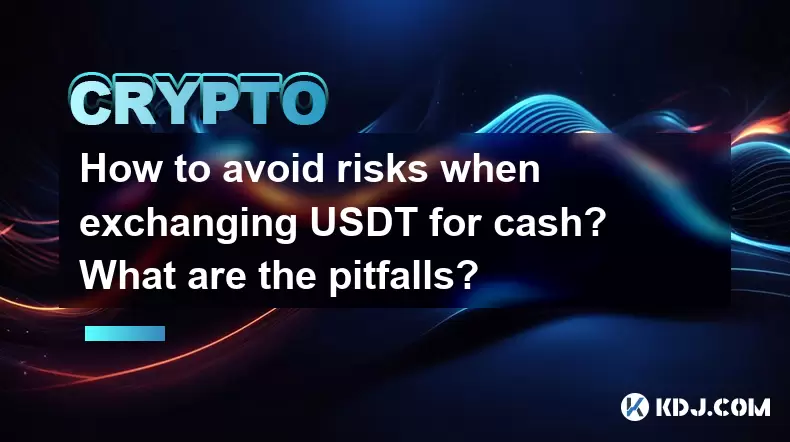
How to avoid risks when exchanging USDT for cash? What are the pitfalls?
Jun 11,2025 at 08:14pm
Understanding the Risks of Exchanging USDT for CashWhen exchanging USDT (Tether) for cash, users must be aware of the potential risks involved. As a s...

How to choose a reliable USDT exchange service provider? How to identify?
Jun 12,2025 at 03:15pm
Understanding the Role of USDT in Cryptocurrency TradingUSDT (Tether) is one of the most widely used stablecoins in the cryptocurrency market. It is d...

What is the most convenient way to cash out small amounts of USDT? Is there a shortcut?
Jun 11,2025 at 11:00pm
Understanding the Need to Cash Out Small USDT AmountsCashing out small amounts of USDT can be a challenge for many crypto users. Traditional methods o...

How to transfer USDT to PayPal or international payment tools?
Jun 15,2025 at 05:28am
Understanding the Basics of USDT and PayPal IntegrationUSDT (Tether) is a stablecoin pegged to the US dollar, offering blockchain-based value transfer...

How to exchange USDT for cash through P2P transactions? Is it safe?
Jun 18,2025 at 07:56am
Understanding USDT and P2P TransactionsTether (USDT) is a stablecoin pegged to the value of the US dollar, making it a popular choice for users who wa...

Will USDT be frozen when withdrawing to a bank account? How to avoid it?
Jun 15,2025 at 10:03am
Understanding USDT Withdrawals and Bank Account Freezing RisksWhen users decide to withdraw USDT (Tether) to a bank account, one of the most common co...

How to avoid risks when exchanging USDT for cash? What are the pitfalls?
Jun 11,2025 at 08:14pm
Understanding the Risks of Exchanging USDT for CashWhen exchanging USDT (Tether) for cash, users must be aware of the potential risks involved. As a s...
See all articles





















![Ultra Paracosm by IlIRuLaSIlI [3 coin] | Easy demon | Geometry dash Ultra Paracosm by IlIRuLaSIlI [3 coin] | Easy demon | Geometry dash](/uploads/2026/01/31/cryptocurrencies-news/videos/origin_697d592372464_image_500_375.webp)




















































